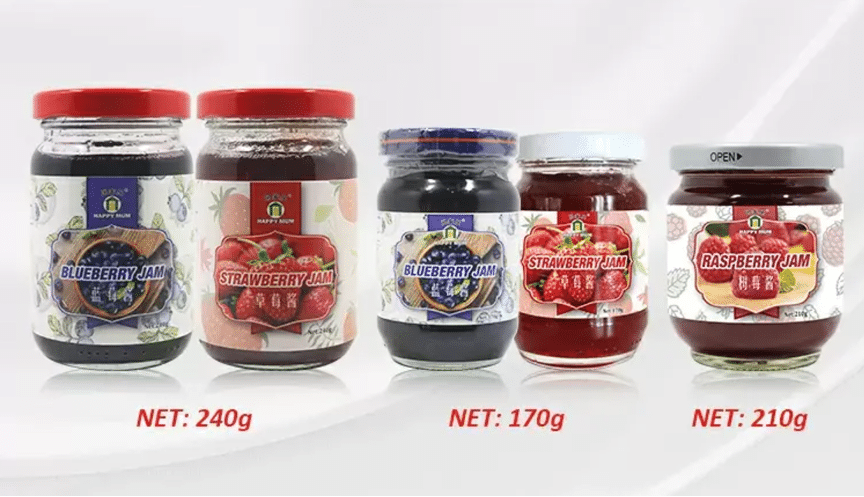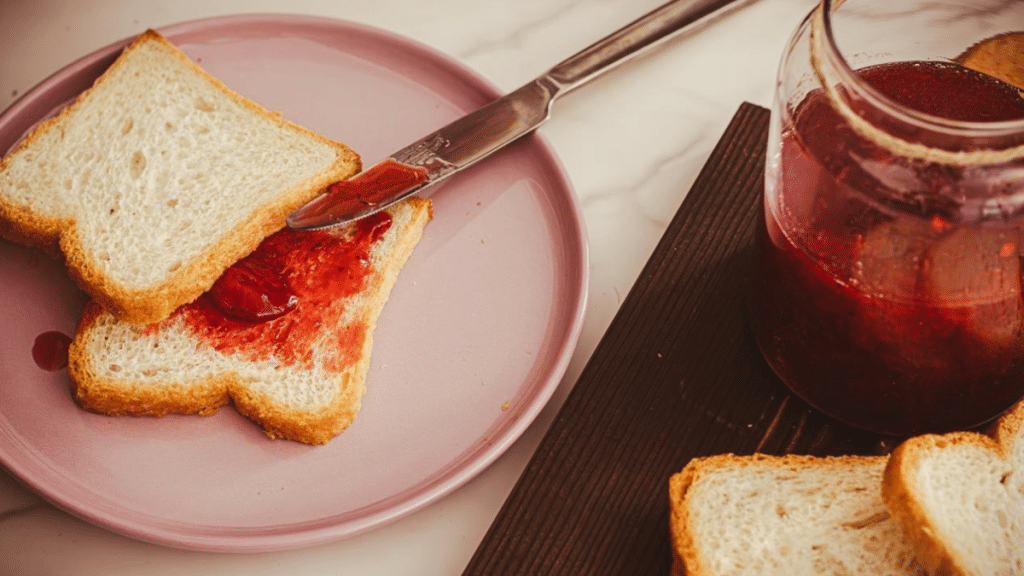Jam, jelly, and marmalade are staples found at tables around the world. These popular treats share common characteristics—they’re sweet and fruity and enhance everything from toast to sandwiches. Then, what is the difference between jam, jelly, and marmalade? Despite similar uses, these spreads have key differences in their recipes, textures, and more. To learn more information about fruit jam vs. jelly vs. marmalade, please keep reading!
What is Jam?
Let’s start our journey with jam to answer the question: what is the difference between jam, jelly, and marmalade?
1. What is jam?
Jam is a thick and textured spread prepared by cooking crushed or pureed fruits with sugar and pectin. Its characteristic feature is the inclusion of fruit chunks or pulp, giving it a hearty and rustic texture. Unlike smooth jellies, jams provide bursts of flavor and texture with every bite, making them a favorite for breakfast spreads and baking.
2. How is jam made?
The first thing is to get fruits prepared. If they are small ones, like blueberries and raspberries, it is okay to cook them whole. However, bigger fruits are better cut into smaller pieces to ensure even cooking and better texture.
Then, these fruits will be mixed with appropriate portions of sugar, pectin, and sometimes acids like lemon juice and cooked until the fruits break down and the mixture thickens. In a jam manufacturing factory, the mixture will then cool down and get ready to be packed in different packages.
3. How long can jam last?
Homemade jam, when stored in sterilized jars and refrigerated properly, typically lasts 2-3 months after opening. Commercially produced jams can last longer due to precise processing and quality preservation methods. For instance, they might be kept for 2 years when unopened, but it is always advisable to finish the opened jams within months and keep them refrigerated.
What is Jelly?
1. What is jelly?
Different from jam, jelly is made using fruit juice and can be made with other ingredients like vegetable juices, wine, or herbs. As there is no piece of fruit or pulp, jelly offers a smooth, glossy texture.
2. How is jelly made?
The process involves extracting juice from fruits by boiling them and then straining out the solids to leave only the liquid. The juice is then cooked with sugar and pectin until it thickens. Common fruits for jelly include apples, grapes, and berries, as their high pectin levels ensure the perfect gel consistency.
3. How long can jelly last?
Similar to jam, commercial jelly can last around 2 years unopened. Once opened, it is typically good for 6 months if refrigerated and kept in airtight conditions. Homemade jelly has a shorter lifespan, lasting around 6-12 months in the fridge due to the absence of added preservatives.
What is Marmalade?
1. What is marmalade?
Compared to jam and jelly, marmalade uses specific fruit types, the citrus fruits. Many people may wonder, “Is marmalade a jam?” The answer is no—marmalade is quite different from jam due to its reliance on citrus fruits and the use of citrus peel. This unique method also gives marmalade a special taste that is both sweet and tangy.
2. How is marmalade made?
The making of marmalade involves boiling citrus fruit (including the peel), sugar, and water. The peel not only adds texture but also lends a slight bitterness that balances the sweetness. Orange marmalade, particularly made from Seville oranges, remains one of the most popular varieties globally.
3. How long can marmalade last?
The shelf life of marmalade is pretty similar to that of jam and jelly. The key is to store it in places away from sunlight and leave it under room or cool temperatures. Marmalade with high sugar content may last longer, as sugar is a natural preservative.
Where to Find Healthy Jams
For those who want to enjoy or offer the finest spreads, JOLION Foods can have you covered. You may be more familiar with the Happy Mum brand, which can be seen in different supermarkets, like Walmart and ALDI, and JOLION Foods manufactures different nutritious Happy Mum sauces.

By utilizing premium ingredients and following strict quality control, JOLION Foods offers different healthy fruit jams that are widely popular across the globe. In addition to fruit jams, they also specialize in OEM & ODM solutions for different sauces, including gluten-free soy sauces, oyster sauces, different types of chili sauces, and more. If you are a business looking for custom-made sauces for your brand, JOLION Foods may have the perfect solution for you!
Conclusion
What is the difference between jam, jelly, and marmalade? The answer lies essentially in how they are made. Different spreads differ in recipes and the way fruits are processed and used. A reliable brand or manufacturer is key to having nutrient-rich and tasty sauces and spreads. Contact JOLION Foods if you are interested in making dishes more flavorful or aim to offer sauces that could be the next best-selling product!

